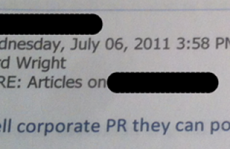Why big tech allows bullying in the workplace

The tech world is full of bullying in the workplace. Strategists revere Oracle’s Larry Ellison for alienating workers and customers to the tune of billions in annual revenues. Thanks to Hollywood, we’ve seen how Mark Zuckerberg acted during the early days of Facebook. Mark Pincus, CEO of Zynga, even boasted about the horrible things he did to get ahead and how fabulous his business became because of it.
Despite all the politically correct rhetoric, it would appear big tech doesn’t really want to get rid of their bullies – they’re too profitable. That’s why those who work for them need to take a more measured approach: If you’re damned if you do and damned if you don’t – better to go somewhere else.
A few years ago my co-worker told me there were two paths to take with our bullying boss: “You’re his bootlicker or enemy.” But my success had little to do with blandishments and flattery for bosses. I had built a marketing career on unabashed candor, a strategy that worked with those bosses who were empowering, not a boss who was bullying in the workplace.
Our boss proudly called himself an equal opportunity offender. He was combative for the sport of it and would pit his workers against each other to test loyalties and consolidate power. He boasted that eliminating redundancies was good for morale because employees could get better desks. He belittled everyone. There’d be a greater moral lesson if it could be said his bullying failed him. On the contrary, he made millions by feigning an aura of evil genius indispensable to the job. His division was making money, after all, and nobody wanted to get in the way of that bottom line.
We’re all very familiar with the failures of those bosses who thrived on bullying, including former JC Penny CEO Ron Johnson who was fired “for costly arrogance” after 17 months on the job. The famously combative Steve Jobs was no better at managing and had been fired for his failures at Apple before a last desperate act returned him to the company – they sequestered the genius jerk among sycophants who kept him innovating without alienating the rest. Ultimately, his rewards exceeded his damage and the company had to turn a blind eye in the face of dizzying profits and innovation.
Our bully had also been sequestered. We were a small division inside a massive company that was adverse to confrontation, so they built a wall around us. “If you talk to anyone in corporate – you’re fired,” he often warned. He contradicted himself later with email provocation to tell another division leader “to pound sand.” By ignoring his mercenary orders I became his enemy. It wasn’t long before I was powerless to do my job.
It should be no surprise there exists plausible deniability for bullying leaders who demonstrate profits – capitalism is a messy business. For this reason it’s up to workers to evaluate and reevaluate their leaders, and then make changes for themselves. Despite well intentioned managers and transformational policies, profits will rule the roost and silence the protestors.
For us, the talent began to depart the company as profits fell and innovation languished. Turns out the boss wasn’t the genius they once thought. After years of bullying by the boss, the division had degenerated into a collection of self-serving factions trying to survive a system based on transactional leadership, an environment where workers are rewarded only by direction of the boss and not by their own successful renderings.
The company did eventually purge that particular bully from the workplace. But by then I’d already quit and had moved on to working with companies not beholden to the profits of bullies. Later, someone asked me why I hadn’t publicized why I was leaving the technology company. But why publicize something everyone knows already? Instead of being a victim, I had taken the initiative to protect myself. Empowerment is the best way to vanquish a bully, after all.



Thanks for this, Richard Aaron Wright. I think anyone who knows you and your consulting work knows that your style is very different. The important thing to realize is that we all have choices where we work and need to choose them properly. I was in a bad relationship with my last co-worker, so it should be pointed out that the bosses are not the only ones who you sometimes need to get away from.
Well done and keep blogging!
Jacky
Bravely and very well said Richard. Sadly, those around such a bully can easily get sucked into the vortex they create. Even if you don’t think you are being a “boot-licker” it appears to outsiders that you MUST be in order to survive in the bully’s orbit. That makes you their enemy. It’s an institutionalized form of abuse with many many victims….
Thanks Simon. My lessons were worth a lot there … tho I’m still trying to find all my old associates to offer them apologies for being too close to the lion’s den!
On Steve Jobs: Business seems to have become (possibly long ago) commanded by the kind of thought that has historically been the domain of military operations- (Single minded focus with an acceptable loss rate). Sociopaths and Narcissist thrive in an environment that institutionalizes their more antisocial behaviors. Profit or Progress Uber Alles “!” moves a company forward but the human cost can be significant. As a capitalist…avowed….I am not advocating for another goal in commerce, that said, I do think that recognizing the humanity engaged in the effort beside you (or better yet, below you) should be a pillar of sound management.